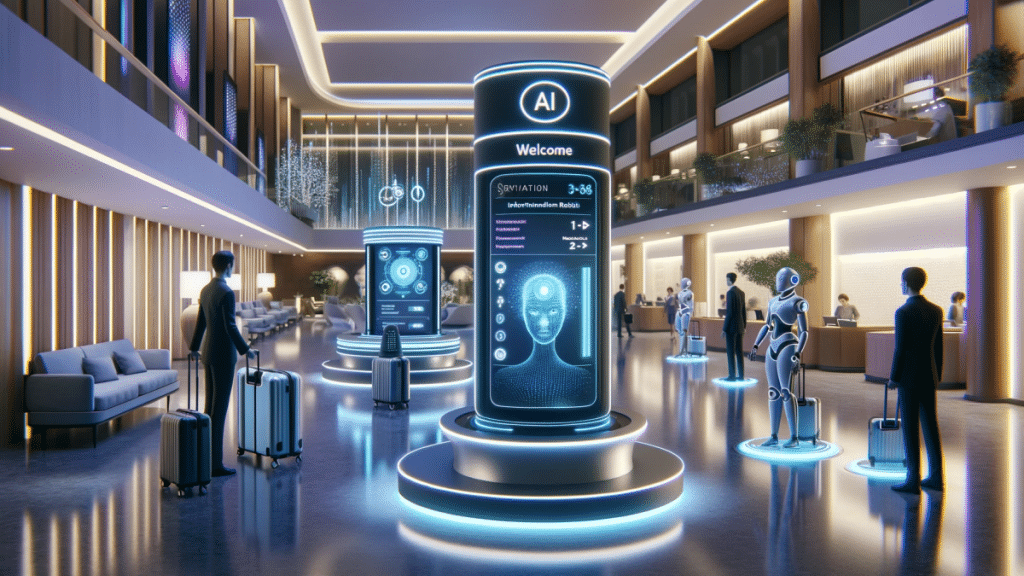In today’s digital era, artificial intelligence (AI) has become an essential component of various industries, revolutionizing traditional practices and introducing new efficiencies. The luxury hospitality sector, which thrives on personalized guest experiences and exceptional service standards, is no exception. AI technologies are reshaping how luxury hotels and resorts market their services, engage with guests, and enhance their overall operations. This article delves into the role of AI in luxury hospitality marketing, highlighting its impact on customer experiences, marketing strategies, and operational efficiencies.
Enhancing Customer Experiences
- Personalized Guest Interactions AI-driven personalization is at the forefront of transforming guest experiences in luxury hotels. By analyzing vast amounts of data, including past booking behaviors, preferences, and social media activity, AI can create tailored experiences for each guest. This includes personalized recommendations for room upgrades, dining options, spa services, and local attractions. For instance, if a guest frequently books spa treatments, AI can suggest exclusive spa packages or new treatments upon their next visit.
- Chatbots and Virtual Assistants AI-powered chatbots and virtual assistants are becoming ubiquitous in the luxury hospitality industry. These tools offer 24/7 customer support, handling a wide range of inquiries from booking confirmations to special requests. By providing instant and accurate responses, chatbots enhance the guest experience while freeing up staff to focus on more complex tasks. Additionally, virtual assistants equipped with natural language processing can understand and respond to guest queries in multiple languages, catering to a diverse clientele.
- Predictive Analytics for Guest Preferences Predictive analytics, powered by AI, enables luxury hotels to anticipate guest needs and preferences before they even arrive. By analyzing historical data and patterns, AI can predict the type of services and amenities a guest is likely to appreciate. This proactive approach not only enhances guest satisfaction but also drives loyalty and repeat business. For example, if a guest prefers a particular type of pillow or room temperature, AI can ensure these preferences are met upon their arrival.
Optimizing Marketing Strategies
- Targeted Marketing Campaigns AI allows luxury hotels to create highly targeted marketing campaigns by analyzing data on guest demographics, booking behaviors, and online interactions. By segmenting guests into specific categories, hotels can tailor their marketing messages to resonate with different audiences. For instance, a hotel might use AI to identify guests who frequently travel for business and target them with exclusive corporate packages or loyalty programs.
- Dynamic Pricing Strategies AI-driven dynamic pricing is revolutionizing revenue management in the luxury hospitality sector. By analyzing real-time data on market demand, competitor pricing, and historical booking patterns, AI can adjust room rates to maximize occupancy and revenue. This ensures that hotels remain competitive while optimizing their pricing strategies based on current market conditions. Dynamic pricing also allows hotels to offer personalized discounts and promotions to specific guest segments, enhancing their value proposition.
- Content Creation and Curation AI is also playing a significant role in content creation and curation for luxury hotels. AI-powered tools can generate engaging content, such as blog posts, social media updates, and email newsletters, tailored to the interests of different guest segments. Additionally, AI can curate content by analyzing guest feedback and online reviews to identify trending topics and preferences. This helps hotels stay relevant and engaging in their marketing communications.
Streamlining Operational Efficiencies
- Automated Check-In and Check-Out AI-powered automation is streamlining the check-in and check-out processes in luxury hotels. Self-service kiosks and mobile apps allow guests to check in and out seamlessly, reducing wait times and enhancing convenience. These systems can also handle room key issuance, payment processing, and personalized room preferences, ensuring a smooth and hassle-free experience for guests.
- Resource Management AI-driven resource management tools are optimizing various operational aspects of luxury hotels, from housekeeping schedules to inventory management. By analyzing occupancy rates and guest preferences, AI can allocate resources more efficiently, ensuring that rooms are cleaned and stocked according to demand. This not only improves operational efficiency but also enhances guest satisfaction by ensuring rooms are ready upon arrival.
- Energy Management Sustainability is a growing concern in the luxury hospitality industry, and AI is helping hotels reduce their environmental footprint through intelligent energy management systems. These systems analyze data on energy usage patterns and adjust lighting, heating, and cooling settings accordingly. For example, AI can reduce energy consumption in unoccupied rooms or optimize temperature settings based on weather forecasts. This not only lowers operational costs but also supports the hotel’s sustainability initiatives.
Conclusion
The integration of AI in luxury hospitality marketing is revolutionizing how hotels and resorts interact with guests, optimize their operations, and enhance their marketing strategies. By leveraging AI-driven personalization, predictive analytics, and automation, luxury hotels can deliver exceptional guest experiences, increase operational efficiencies, and drive revenue growth. As AI technology continues to evolve, its role in the luxury hospitality sector will only become more significant, shaping the future of the industry and setting new standards for excellence and innovation.
In a world where guest expectations are constantly evolving, AI offers luxury hotels the tools they need to stay ahead of the curve and deliver unforgettable experiences. Whether it’s through personalized recommendations, dynamic pricing, or automated check-in processes, AI is transforming the luxury hospitality landscape and redefining what it means to provide exceptional service. As the industry continues to embrace AI, the potential for innovation and growth is limitless, promising a future where luxury hospitality is more personalized, efficient, and sustainable than ever before.
Angela Spearman is a journalist at EzineMark who enjoys writing about the latest trending technology and business news.
